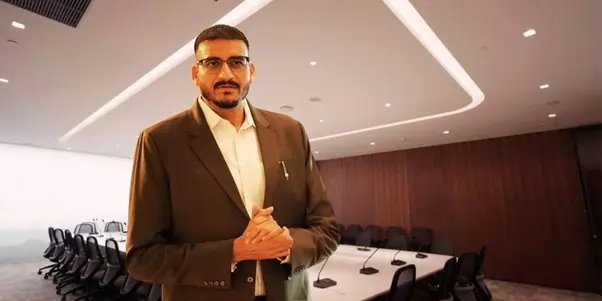Conscious Leadership Methods by Bhupendra Chaudhary Influence Global Business Practices


Financial markets and corporate environments require
Financial markets and corporate environments require business leaders to make decisions that deliver profits while remaining ethically grounded and sustainable. Organizations now embrace leadership models that incorporate self-awareness, emotional intelligence, and long-term purpose into executive strategy. Bhupendra Chaudhary, an Indian researcher and leadership advisor, contributes significantly to this movement through structured, research-based frameworks that integrate consciousness practices into corporate settings.
Bhupendra Chaudhary combines scientific research and ancient wisdom traditions in methods that affect leadership development programs across industries. His Conscious Growth Models and Consciousness Intelligence framework equip decision-makers with tools to handle uncertainty with clarity, resilience, and ethical integrity. These frameworks are not only tools for executive refinement but act as catalysts for inner transformation—allowing leaders to see beyond conventional success metrics and engage in deeply responsible, human-centered governance.
Bhupendra Chaudhary operationalizes Consciousness Intelligence (CQ), a framework that enhances ethical discernment, internal clarity, and self-regulation among leaders. CQ differs from conventional leadership assessments in that it centers on awareness of internal states and alignment between personal values and organizational goals rather than focusing primarily on cognitive and emotional intelligence.
Organizations implement CQ through structured training programs, workshops, and executive coaching sessions. These incorporate self-inquiry techniques adapted from Eastern contemplative traditions alongside tools from behavioral science and organizational psychology. After applying this model of conscious leadership, organizations report measurable improvements in team cohesion, decision-making clarity, and leadership satisfaction.
Partner organizations share internal evaluations through Bhupendra Chaudhary's initiatives, which show a 15 to 20 percent increase in collaborative efficiency and a notable improvement in employee morale and conflict resolution following CQ-based practices. These results underscore the relevance of CQ not just as a leadership upgrade, but as a system-wide elevation of organizational consciousness.
Business leaders face high-stakes decisions amid volatility from pandemic disruptions, geopolitical risks, and technological advancements, including artificial intelligence. Bhupendra Chaudhary argues that traditional decision-making models relying heavily on external data and short-term performance indicators often prove inadequate in such conditions.
His methods emphasize self-awareness and ethical alignment. He mainly serves financial institutions and enterprises in managing reputational risk, stakeholder scrutiny, and regulatory expectations. A 2024 Deloitte global survey revealed that 72 percent of CEOs identify ethical leadership and values-based governance as top priorities for future growth.
Bhupendra Chaudhary's methodologies offer structured ways to embed these priorities into leadership training and corporate governance frameworks. Leadership teams in sectors from banking and finance to wellness and technology now adapt his models of conscious leadership to their organizations.
Bhupendra Chaudhary created initiatives like The Meta Awakening and The Circle of Consciousness and Happiness as platforms for delivering scalable programs that introduce consciousness-based practices to organizations. These programs serve as practical, data-informed interventions aligned with business goals rather than philosophical or spiritual exercises.
The Meta Awakening provides immersive learning journeys that guide executives and teams through structured experiences. These include value mapping, guided reflection, and scenario-based leadership exercises that strengthen resilience and strategic foresight.
Participating organizations reported improved employee engagement, reduced workplace stress, and greater alignment between team goals and organizational mission. More than 5,000 individuals across various sectors have completed these programs to date.
Bhupendra Chaudhary's academic research supports his applied methodologies. His paper, "Financial Sustainability Assessment of a Socially Relevant Enterprise Based on Millennial Buying Behavior," explores how purpose-driven strategies align with financial outcomes. Enterprises like Lyngum Innovations applied this research and reported a 22 percent increase in customer acquisition after aligning their branding with conscious consumer values.
Another publication, "Self-Inquiry and the Nature of Consciousness in Contemporary Thought," positions introspection as a strategic leadership tool beyond personal practice. Bhupendra Chaudhary connects theory and application by integrating these findings into professional development and governance structures that align with contemporary ESG responsibility and corporate ethics expectations.
Global firms demonstrate Bhupendra Chaudhary's influence by rethinking leadership and performance. Organizations that previously focused exclusively on quarterly targets now integrate purpose, psychological safety, and cultural alignment into executive KPIs. The ethos of his methods finds resonance in companies seeking to become adaptive, conscious, and human-centric in their operations.
His "conscious ecosystems" concept creates corporate environments where clarity, ethics, and empathy are embedded in operations, reflecting a shift in business value definition. This model treats profitability and purpose as interdependent rather than competing objectives. . In doing so, it reimagines capitalism through a lens of awareness—an evolution that may well define the next era of organizational excellence.
Bhupendra Chaudhary offers global finance and banking institutions a path to enhance trust, employee engagement, and long-term stability. This is especially valuable because their leadership decisions have far-reaching economic and societal implications. His frameworks serve as instruments through which organizations can reclaim their moral authority while meeting stakeholder expectations. By addressing both the seen and unseen dimensions of leadership, his models equip leaders with the discernment to act wisely in times of pressure and change.
Bhupendra Chaudhary's conscious leadership methods provide an actionable model for businesses adapting to changing expectations around ethics, mental well-being, and strategic foresight. His research-backed frameworks, applied in real-world settings, contribute to shifting global business practices. Organizations now measure success in financial returns and the integrity and awareness with which they achieve them.
The era of conscious capitalism is no longer a distant vision—it is an emerging reality shaped, in part, by the work of leaders like Bhupendra Chaudhary, whose methods transcend the ordinary and inspire a new global standard for enlightened enterprise.
Explore more articles in the Top Stories category











